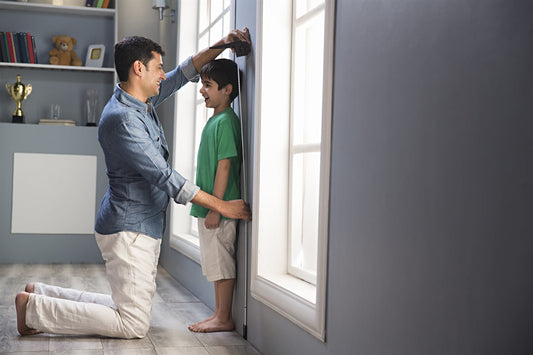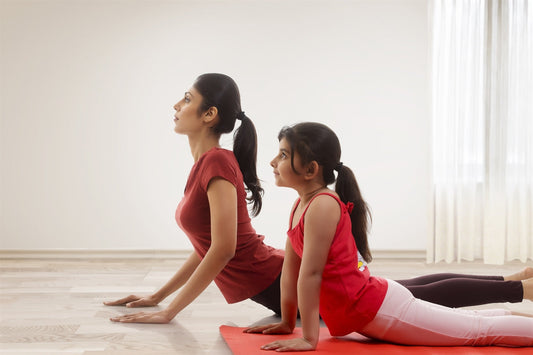Isn't it amazing to watch your toddler respond to your voice, learn new words or learn to eat on their own! At every age, your child achieves a set of wonderful milestones. Let us take a look at these developmental breakthroughs so that you know what to look forward to in your rapidly growing toddler.

By The Age Of 2 Years
Motor Skills4
Gross Motor Skills:
By this age, your toddler is walking and running, jumping, standing on toes, climbing, and kicking a ball.
Fine motor skills:
They can now brush their teeth, build block towers, hold spoons and crayons with fingers, draw straight lines and circles.
Cognitive Skills5:
They can now indulge in pretend play, solve simple puzzles, and follow two-step instructions such as "pick up the toy and put it in the box".
Communication Skills:
They have started pointing at things when they are named. They know the names of familiar people and body parts and are repeating words that they hear often.
Social-Emotional Skills:
They're starting to mimic and play with other kids. On the downside, they have also begun to disobey you and throw tantrums.
By The Age Of 3 Years
Motor Skills7:
Gross Motor Skills:
They can now run without tripping, hop, and climb stairs with one foot after the other.
Fine Motor Skills
They can safely play with toys with moving parts and buttons. They can also turn the pages of a book unassisted.
Cognitive Skills8:
They begin to name colours, recite numbers from one to ten, retell stories and follow basic 3-step instructions.
Communication Skills:
They start to use basic grammar, speak coherently with strangers, and call out their friends with their names.
Social-Emotional Skills9:
They begin to show interest or reluctance in going to new places.
By The Age Of 4 Years
Motor Skills10:
Gross Motor Skills:
They are now walking downstairs with alternating feet, and they can also walk backwards.
Fine Motor Skills:
They can draw a cross, cut and fold papers in half. They also begin to notice the sensations and express the natural urges of wanting to 'go to the loo.'
Cognitive Skills11:
They are learning to speak in more complex sentences; they also understand joking and teasing.
Communication Skills:
They're successfully applying some basic grammar rules such as correctly using pronouns, singing songs, telling stories, saying the first and last names of people.
Social-Emotional Skills12:
They have their own opinions and are displaying choices in the kind of friends they make. They begin to enjoy doing new things and are becoming more patient and compliant.
By The Age Of 5 Years:
Motor Skills13:
Gross Motor Skills:
They can now skip, sit down, get up on their own, and are very good at catching a ball.
Fine Motor Skills:
They can draw squares, colour between lines, wash and dry their hands on their own.
Cognitive Skills14:
They have now begun to speak using complete and intelligible sentences. At this age, you will find that they can recall a story at will.
Communication Skills:
They have learnt to write names, speak clearly, use future tense correctly, remember and recall essential addresses.
Social-Emotional Skills15:
They're slowly becoming independent, playing without parents, wanting to make friends and please them, besides being demanding and cooperative at times.
From 6 Years To 8 Years
Motor Skills16:
Gross Motor Skills:
They can ride a bicycle without support wheels, catch a ball with one hand, play hopscotch and rope skipping etc.
Fine Motor Skills:
They can hold and use a pencil easily, move fingers to write and draw rather than move the whole arm, learn to write above the lines, etc.
Cognitive Skills17:
They can now tell their age and can also read and write.
Communication Skills:
They learn to express themselves better, understand cause-and-effect relationships and display knowledge of others' feelings.
Social-Emotional Skills18:
They start thinking about the future, giving more importance to friendship and team and want to be liked by friends.

Whether your child is developing well or not depends a lot on the diet they receive. As parents, you do your best to provide them with all the essential nutrients through their diet. However, this diet might not be enough for your fast-growing pre-schooler.
We know how demanding they can be when it comes to eating. So, a tasty health food drink like Junior Horlicks# can go a long way in filling the nutritional gaps in your child's regular diet. Junior Horlicks# contains nutrients like choline, iron, iodine, etc. These are known to support brain development. Also present are calcium, Vitamin D, Vitamin K & protein, which are known to support physical growth and development. It also contains nutrients such as Vitamin E, A, Selenium & copper, which support healthy immune function.







